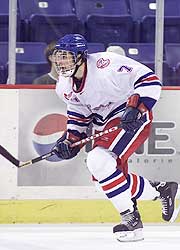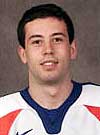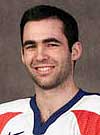They have left one of college hockey’s most surprising teams and joined what they hope will be one of the Olympic Games’ big surprises. UMass-Lowell’s Yorick Treille, Laurent Meunier and Baptiste Amar have joined the French National Team and are, as the title says in their native tongue, on the way to the Olympics.
On Monday, Jan. 28, Team France will face Minnesota in an exhibition game and then take on Wisconsin one day later. It will then continue on to Salt Lake City where it will play exhibition games against several of the other eight teams competing in the play-in round.

From Feb. 9-13, Belarus, Ukraine, Slovakia, Germany, Austria, Latvia, Switzerland and France will play three games to see which two teams move on to the next round. The two survivors will then face long odds when they take on ice hockey’s Olympic superpowers: Canada, Sweden, Russia, Finland, the Czech Republic and the United States.
“Our goal is to go get that qualifying spot and go from there, to come out of our pool and play against the top six nations,” says Treille.
While not the only collegians heading to Salt Lake City — UMass-Amherst’s Thomas Pock, for example, has joined the Austrian team — the three Frenchmen have taken the biggest bite out of any roster in the country. Coming into the weekend of Jan. 24, Treille and Meunier were the second and third scorers for the River Hawks while Amar was tied for second in scoring among the team’s defensemen. Their combined 44 points amounted to 22 percent of the team’s scoring, a figure that would be even higher if Meunier had not been recently sidelined with a fractured scapula.
With Lowell having been in first place in Hockey East, second in the Pairwise Rankings and third in the polls as recently as a week and a half ago, it’s been difficult for the three to leave their teammates behind in ways that might have been easier if the team were instead in last place, mired in a 10-game losing streak and with players getting on each other’s nerves.
“Definitely, especially right now,” says Treille. “We had a good start and we know that we needed that, but we know that we haven’t done anything yet. The most important part of the season is coming down the stretch. The eight games that we’re going to miss are just going to be huge for us.
“I really wish we could be a part of it here and help my team as much as I can and contribute, but it’s a once-in-a-lifetime [opportunity], too, so I’m going to have to go.”
Amar echoes these sentiments.

“It’s not easy to leave the team, especially now,” he says. “We have a great time together. We have a good atmosphere on the team, so it’s never easy to leave the team. But we knew it at the beginning of the year, so we were prepared for it. Now it’s time to leave.”
Although the official announcement from Team France didn’t come until Jan. 3, all three players had been regulars for the past couple years and were no-brainers to go to Salt Lake City.
Despite the difficulty of leaving the River Hawks, all three feel a sense of pride in playing for France on the Olympic stage.
“It’s special because it’s your country,” says Meunier. “You’re proud of your country and you want to play for your country all the time. It’s like if you’re going to war and you’re defending your country. It’s different because we’re not in wartime, but it’s still like that.”
For Amar, it’s the realization of a dream.
“Every [athlete] talks about the Olympics,” he says. “It’s maybe the biggest tournament. Everybody dreams about that, so it’s a big achievement to play in that tournament. I started on the national team maybe two or three years ago and my biggest goal was to participate in the Olympics. Now it’s part of reality, so I really [look forward] to playing.”
Like Meunier, Treille also compares the honor to going to war.
“I take a lot of pride in playing for UMass-Lowell,” he says. “I’ve been here four years. It’s my school, you know? You just know all the people here. You play for your school. Maybe you don’t realize in your freshman year what it means, but by the time you’re a senior it really means a lot.
“[But] then when you play for your country, it’s a little level above because it’s your roots. It’s your country. It’s like you’re going to war, kind of. That’s how you look at it in a way.
“When you’re a little kid like me growing up in France, that’s what you look up to, your national team. It’s everything for you. I’ve had a chance to represent it [before], but now it’s the Olympics and that’s the biggest competition ever.
“Especially for me playing [at Lowell] with all the Canadians and Americans on the team and we even have a Swede, you just realize that it’s pretty much impossible for them to make their national team. But we have the chance to go represent ours and we don’t take that for granted. We realize that we’re lucky in a way. We’re just going to go and represent [our country] the best that we can.”
Those teammates who had no shot at Salt Lake City have needled the three Frenchmen about their chances during the usual locker room banter.
“They just rip on it,” says Treille. “They pretty much make fun of us, saying that we’re going to lose anyway so just stay here [at Lowell]. Don’t even bother going, that’s what I get.”
Treille has the perfect rejoinder.
“At least I’m going,” he says.
“They are maybe a bit jealous,” says Amar. “Sometimes they make fun of us, like, [the preliminary round is] not the real Olympics. You’re going to lose really quickly, so you’ll be back really soon.
“But that’s a bit normal. It’s a big chance that we have and everybody can’t do it and I understand their reaction. They are not really mean, just joking.
“They realize we are very lucky because they know they normally can’t go to the Olympics because they are part of a big country. That’s the difference for us; it’s easier to be on the national team than for them. They realize we are lucky to go to the Olympics because they can’t do that.”
In the meantime, the River Hawks will have to survive without three key components of their success.
“There are no perfect situations in anything,” says UML coach Blaise MacDonald. “You need to look at the glass as half filled instead of half empty. To have them represent Hockey East, UMass-Lowell, and their families with a great sense of pride and play for their country, that’s such a win-win, positive thing for us and for them. We’re very proud of them.
“It gives some other guys on our team a wonderful opportunity and a great challenge to increase their productivity by 5-to-10 percent in their absence.”

Although it could be whistling past the graveyard, Meunier remains as optimistic as MacDonald that the River Hawks will succeed despite the holes in the lineup.
“I’m confident in the team,” says Meunier. “They can step up and play well with others [in the lineup]. They don’t need us. It’s going to be a great chance for them to play with other [contributors]. When we come back, just before the playoffs, it’s going to be a good thing for the team, I think.”
Since the six national teams that do not advance to the next round still play a placement game, the three Frenchmen will still return after Lowell’s key series against Boston University on Feb. 15-16. Theoretically, they could also miss another two games the following weekend if Team France somehow advances to the gold medal game, but even Treille admits with a laugh that “it won’t happen.” As a result, the River Hawks left behind won’t be inwardly cheering “Go Switzerland!” on Feb. 9 just to get the Frenchmen back as quickly as possible.
“We want them to have a good experience there,” says MacDonald. “A good experience is: whatever you put into it is what you’re going to get out of it. If they play well and play hard, but perhaps lose every game, then they’ll feel pretty good about their efforts. We want them to have whatever success they deserve. Whenever they come back, we’ll be a better team and they’ll be better individually.”
Perhaps the River Hawks will survive nicely without the Frenchmen. Perhaps not. Either way, the three will be back for the Hockey East playoffs and, if Lowell’s pace holds up, a potential run at the NCAA title.
And if somehow the heavens open and God grants that the Frenchmen can choose between winning a national championship for UMass-Lowell and winning an Olympic medal for France, which would they pick?
While Amar begs off the question, Treille answers pragmatically.
“I’d probably go for a national championship here because I know it’s a lot more realistic goal,” he says.
Meunier, however, responds from the heart.
“[I’d go for] the medal with the French team,” he says. “It’s your country. It only happens once every four years. It’s huge, the biggest tournament ever.”
Still, he recognizes the near-impossibility of the task.
“I don’t know if God can do that,” he says with a laugh. “We could be the new Miracle On Ice.”
Presumably, there would then be a French equivalent of “America’s Guest” Mike Eruzione, who scored the goal to beat the Russians in 1980 and, according to rink legends, has never had to pick up a check or work at anything other than his golf game ever since.
Meunier considers the possibility.
“That would be nice,” he says.
Thanks to my nephew Greg Hendrickson, who assisted me in the title’s translation. Although he’s not a French major, he’s forgotten more of that language than I ever learned. Je ne parle Francais bookoo.


